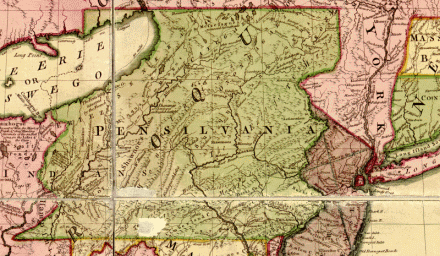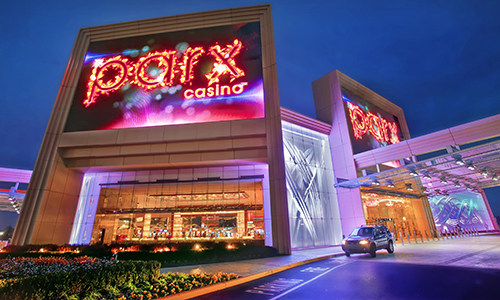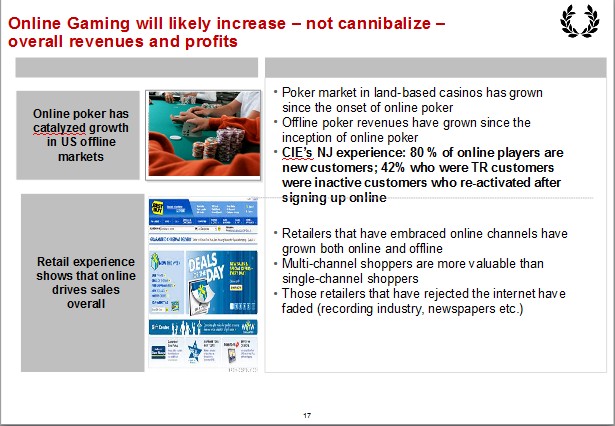Parx, Caesars Offer Dueling Testimony in Pennsylvania House Online Gambling Hearing
Tuesday’s contentious hearing in a Pennsylvania joint Pennsylvania House and Senate hearing over the possible legalization of several forms of online gambling brought testimony from interested stakeholders. Among the dozen witnesses who testified, most of them representing major corporate casino concerns, two stood out. Philadelphia’s Parx Casino turned out to against the expansion into online poker, based largely out of fears of cannibalization of its brick-and-mortar casino business.
 On the flip side, in a pro-online gambling stance, was Caesars Entertainment, along with many of the other casinos and businesses appearing at the hearing. Caesars, which owns and operates the Harrah’s Chester casino (Chester is a Philadelphia suburb), effectively debunked much of Parx’s “don’t rock the boat” fears.
On the flip side, in a pro-online gambling stance, was Caesars Entertainment, along with many of the other casinos and businesses appearing at the hearing. Caesars, which owns and operates the Harrah’s Chester casino (Chester is a Philadelphia suburb), effectively debunked much of Parx’s “don’t rock the boat” fears.
Parx’s shift into the anti-online gambling camp surprised many observers, as the casino had generally been neutral on the matter beforehand. While Parx acknowledged that if online gambling was approved in Pennsylvania, it would join the market, the casino made clear that all things considered, it would rather not.
Testimony offered by Parx Chairman Robert W. Green at the hearing was a clear attempt to fearmonger legislators into turning down the online gambling expansion, under the suspect argument that approving such gambling might lower the total tax revenue receives from licensed gambling activity, rather than raise it.
According to the Parx testimony:
[The] overwhelming success [of Pennsylvania’s casinos] reflects the significantly higher gaming tax rate on Casinos in Pennsylvania, with the overall effective rate on slot machines at 59%, and the prudent structural framework for the industry that was established in our enabling legislation. We have twelve Casinos today, with another soon to arrive in Philadelphia, which effectively serves the residents of the Commonwealth by locating them judiciously in the major population centers, and by avoiding oversaturation of markets. We have an orderly market structure that respects the investment made in our communities. After 10 years of development, our industry has matured to the point where approximately two-thirds of Pennsylvanians live within 25 miles of a Casino.
We are mindful that the legislature is faced with a budget deficit and is exploring options to increase revenue. We are also aware that forces from outside the Commonwealth are advocating an expansion of gaming based upon results in other states. Although it could be tempting on the surface to look at your major tax contributor to see if there is additional opportunity, we caution that great care must be taken to avoid undermining the very foundation of our great success. We believe that many of the proposals currently under consideration will actually lower the tax revenue generated by our industry and effectively kill the golden goose. To be clear, these proposals ask the Commonwealth to trade the 59% tax brick-and-mortar casinos are paying for either the 30% paid by VGT’s in Illinois or 15% for Internet Gaming. It is clear that the net effect of these proposals will be a reduction in gaming taxes for the Commonwealth, along with thousands of jobs and hundreds of millions of investment dollars by the brick and mortar operators.
After assailing the possibility of the VGTs (video gaming terminals), which could shift significant revenue from the casinos to the thousands of Pennsylvania’s bars, the Parx testimony then turned to the online-gambling proposal more specifically. Some excerpts, along with a thank-you link to OPR, for beating Pennsylvania’s state legislative site itself in getting much of the testimony online for public view:
The next major issue to discuss is Internet gaming. Once again, the legislature is asked to accept a 15% rate of tax versus the 59% it currently receives, and is being told that this represents an incremental revenue opportunity based on the experience in New Jersey. However, even more so than in the VGT discussion, there couldn’t be greater differences in approach, structure and success than New Jersey and Pennsylvania. …
As you know, New Jersey gaming revenues have decreased from a peak of more than $5 billion to $2.8 billion in 2014 and approximately $2.2 billion today. Their casinos pay a tax of 9% at brick-and-mortar casinos, and 15% for online gaming, a substantial increase above the casino rate. They contributed $237 million in tax revenue in 2015, or one-sixth of what the PA casinos generate. All of their casinos are concentrated in one central location, Atlantic City, as New Jersey created a destination type market that drew from the population centers of Philadelphia, northern New Jersey and New York rather than the more locals, convenience structure built in PA. In fact, only 5% of New Jersey residents live within 25 miles of a casino, as opposed to two-thirds in PA. …
The Parx testimony went on to claim that tiny Delaware was likely a more accurate comparison to Pennsylvania’s possible online-gambling future. A simple extrapolation from Delaware’s roughly $3 million in online revenue might translate to a paltry $45 million in annual revenue for the much more populous state of Pennsylvania.
Then came the blatant fearmongering:
Another point that must be addressed with Internet gaming is the theory that this is incremental revenue and will not affect the existing casinos. How can we reasonably assume that after Blockbuster video, Tower records, Borders, and now many major retailers like Macy’s, JC Penney and Sears are closing stores and eliminating jobs due to competition from online retailing, our industry is somehow different? Who else should we expect will gamble online but a person who has visited a casino? It is even more important to note that the demise of brick-and-mortar retail occurred with a level playing field; they all paid the same taxes. Given all these facts, I find it impossible to assume that a brick-and-mortar casino paying 59% in taxes will not lose significant business to an online operator paying 15% in an open, unprotected market.
Therefore, it is our view that the Commonwealth will lose revenue by implementing Internet gaming. If you assume generously that we could generate $100 million in revenue through the internet, I am certain that 50% of that total would come at the expense of an existing casino. In that case the Commonwealth would lose almost $15 million dollars per year by trading for slightly more revenue at a much lower tax rate.
That’s a vast oversimplification of the effect online retailers have had on a handful of well-established brands, though there’s more than a bit of head-in-the-sand feeling about it all. Apparently, Parx feels that online gambling can simply be pretended away into nothingness, as if all forms of such gambling haven’t been available, via unregulated grey-market operators, for the better part of two decades.
That “59%” figure bears further examination, too. Elsewhere in the testimony, it’s noted that the figure represents “the overall effective rate on slot machines,” which means it’s based on net profits, rather than gross gaming revenue (GGR). That’s like comparing something measured in meters to something else measured in feet.
But, no matter. Parx’s fact-deprived submission paled compared to that offered by Caesars, which had a more accurate take on Parx’s false cannibalization theory. Caesars offered the joint committee a 21-slide PowerPoint presentation, which included numbers from CIE’s New Jersey online sites. Rather than the 50% that Parx’s chairman believes, the numbers from CIE’s major site show that 80% of the sites’ customers were, effectively, new gamblers.
Here’s that slide from the Caesars Powerpoint:
The Caesars presentation, overall, did far more than debunk claims such as those offered by Parx. The slide series offered a complete top-level look at the history of online gambling, both unregulated and regulated; the ongoing federal-level battle over a RAWA-style bill (including a blind-reference swipe at LV Sands CEO Sheldon Adelson); and even an examination of the online security protocols in place that have made the regulated offerings in states such as New Jersey and Nevada far more secure and responsible than even that obtainable in most land-based casinos.
From Tuesday’s hearing, more action will surely come. Pennsylvania remains on the short list of states likely to become the fourth US state officially authorizing some forms of online gambling. 2017 is shaping up to be that year.





















COMMENTS